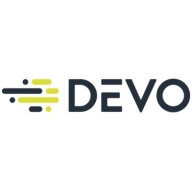

Find out in this report how the two Log Management solutions compare in terms of features, pricing, service and support, easy of deployment, and ROI.


Devo is the only cloud-native logging and security analytics platform that releases the full potential of all your data to empower bold, confident action when it matters most. Only the Devo platform delivers the powerful combination of real-time visibility, high-performance analytics, scalability, multitenancy, and low TCO crucial for monitoring and securing business operations as enterprises accelerate their shift to the cloud.
Splunk Cloud Platform is widely used for log management, security monitoring, application performance monitoring, troubleshooting, data aggregation, and IT operations. It centralizes logs from numerous sources, enabling detailed analysis, incident detection, and effective dashboard creation.
Companies across various industries leverage Splunk Cloud Platform for cybersecurity, compliance, user activity monitoring, and alerts. It helps in managing cloud environments, optimizing data storage costs, and enhancing customer insights with effective data visualization. The platform's robust capabilities include customizable reporting, flexible log sending, powerful search features, and seamless integration with other systems. Users monitor multiple environments and platforms effortlessly with the cloud infrastructure maintained by Splunk. Despite its advantages, users find the pricing steep, support ineffective, and encounter performance issues with large data volumes. Integration challenges, limited training resources, and insufficient documentation also pose concerns.
What are the most important features of Splunk Cloud Platform?Splunk Cloud Platform is implemented across industries including finance, healthcare, retail, and technology. Organizations use it to enhance cybersecurity measures, meet compliance requirements, monitor user activities, and issue automated alerts. In finance, it assists in fraud detection and compliance. In healthcare, it ensures data security and regulatory adherence. Retailers use it for customer behavior analysis and performance monitoring, while technology companies benefit from its troubleshooting and log management capabilities. Despite its powerful features, companies face challenges with pricing, support, and integration that require consideration during implementation.
We monitor all Log Management reviews to prevent fraudulent reviews and keep review quality high. We do not post reviews by company employees or direct competitors. We validate each review for authenticity via cross-reference with LinkedIn, and personal follow-up with the reviewer when necessary.